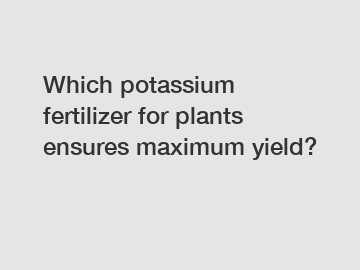Which potassium fertilizer for plants ensures maximum yield?
Which potassium fertilizer for plants ensures maximum yield?
Potassium is an essential nutrient for plant growth and plays a crucial role in various physiological processes. It is involved in enzyme activation, osmoregulation, and the transport of sugars and nutrients within the plant. Adequate potassium supply significantly influences crop yield and quality. Choosing the right potassium fertilizer is therefore vital to achieve maximum yields.
The primary options for potassium fertilizers are potassium chloride (KCl), potassium sulfate (K2SO4), and potassium nitrate (KNO3). Each of these fertilizers provides potassium in different forms and amounts. However, the choice depends on various factors such as soil type, crop type, and their specific nutrient requirements.

Potassium chloride (KCl) is the most commonly used potassium fertilizer due to its high potassium content and relatively lower cost. It supplies pure potassium in chloride form. This form of potassium is readily available to plants and can enhance crop yield. However, it is important to note that excessive chloride application may cause soil salinity issues or negatively impact chloride-sensitive crops.
Potassium sulfate (K2SO4) is an alternative potassium fertilizer that provides potassium in the sulfate form. This fertilizer is particularly suitable for crops that require high sulfur content, as it supplies both potassium and sulfur. Sulfur is essential for protein synthesis, enzyme activation, and chlorophyll formation. Therefore, using potassium sulfate can not only enhance yield but also improve crop quality.
Potassium nitrate (KNO3) is another potassium fertilizer option that supplies both potassium and nitrogen. Nitrogen is another vital nutrient required for plant growth, responsible for foliage development and overall plant vigor. By using potassium nitrate, farmers can ensure a balanced nutrient supply, leading to maximum yield and better nitrogen utilization efficiency.
In conclusion, the choice of potassium fertilizer depends on the specific needs of the crop and the soil it is grown in. Each potassium fertilizer option has its advantages and considerations. Potassium chloride is a cost-effective choice, while potassium sulfate provides additional sulfur for sulfur-demanding crops. Potassium nitrate offers a balanced supply of potassium and nitrogen, promoting both yield and plant vigor. Careful consideration should be given to selecting the appropriate potassium fertilizer to ensure maximum yield and optimize crop quality.
If you are looking for more details, kindly visit Granular NPK Fertilizer, calcium ammonium nitrate fertilizer, 19 19 19 fertilizer.

Comments
0